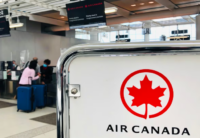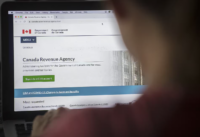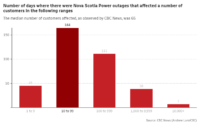An Ontario couple says Air Canada failed to protect them and then blamed them after their flight was mysteriously cancelled and the credit used to buy a business class ticket to Tokyo — for someone they’d never met. Bill and Sandra Barlow spent more than a year saving for their dream trip to South and Central America, which was a 75th birthday celebration for Bill. The Milton, Ont., couple used travel points and cash — just over $5,000 in total — to book their return flights in business class. Read…
Read MoreCanadians’ health data at risk of Trump’s AI ambitions, experts warn | Global News
Medical researchers and lawyers say our rocky relationship with the United States creates an urgent need to protect a critical Canadian resource: patient health information that can be used to train artificial intelligence. “Our health data is the most valuable health data set in the world,” said Natalie Raffoul, an intellectual property lawyer in Ottawa. “You can’t go to any other jurisdiction and be able to pool a data set like this because no one else has a public health system like this with the kind of ethnic diversity that…
Read MoreWhat could possibly go wrong? DOGE to rapidly rebuild Social Security codebase. | arsTECHNICA
The so-called Department of Government Efficiency (DOGE) is starting to put together a team to migrate the Social Security Administration’s (SSA) computer systems entirely off one of its oldest programming languages in a matter of months, potentially putting the integrity of the system—and the benefits on which tens of millions of Americans rely—at risk. The project is being organized by Elon Musk lieutenant Steve Davis, multiple sources who were not given permission to talk to the media tell WIRED, and aims to migrate all SSA systems off COBOL, one of…
Read MoreWho’s hacking CRA accounts? | CBC News
The drive from Kelowna to Creston, B.C., carves south through snow-covered mountains, joins up with the Kettle River and then follows the Crowsnest Highway east as it detours north at Christina Lake. Five hours later, sprawling farmlands welcome visitors on their way into town, 12 kilometres north of the U.S. border. Heidi Germann was born and raised in Creston, travelled the world and then returned to her roots. She says it was community that pulled her home, and a deeply shared history that binds the town together. Read full story…
Read More‘It’s not justified’: More complaints from Nova Scotia Power customers on bill spikes | Global News
A growing number of Nova Scotians are experiencing power bills that they say have suddenly doubled or tripled, raising calls for Nova Scotia Power to be investigated. The Nova Scotia Utility and Review Board said they’re looking into some complaints but that investigation is on hold as New Brunswick Power is being audited for similar concerns. After a Global News story last week on the issue, dozens of Nova Scotia Power customers have reached out to share their complaints. Read full story here: ‘It’s not justified’: More complaints from Nova…
Read MoreNova Scotia Power gets green light to raise power rates 2.4% | CBC News
The Nova Scotia Utility and Review Board has given Nova Scotia Power the go-ahead to raise power rates an average of 2.4 per cent. The money collected through higher rates will cover the first instalment of paying down a $500-million federally backed loan. The electric utility applied for the rate increase last fall after securing a long-sought federal bailout. Nova Scotia Power has said it needed the money to balance unrecovered fuel costs that it had been shouldering as part of the fallout from delays to the Muskrat Falls hydroelectric…
Read MoreWe tracked N.S. power outages in 2024. There were unplanned outages nearly every day | CBC News
An analysis of power outage data shows that there was at least one unplanned outage in Nova Scotia nearly every day in 2024. Over the year, there were more than 4,700 outages, recording just a single day without an unplanned outage. CBC News reviewed Nova Scotia Power’s online power outage map each day throughout 2024 to track reported outages. Parts of urban centres like Halifax and Sydney experienced dozens of outages over the year, though rural and remote parts of the province also dealt with inconsistent power. Read full story…
Read MoreGrowing calls for big grocers to be held accountable for overcharging customers by selling underweighted meat | CBC News
After Deborah Eakins read the recent CBC News investigation about Loblaw, Sobeys and Walmart grocery stores overcharging customers by selling underweighted meat, she weighed her ground beef. To her surprise, the meat, bought at Sobeys-owned Pete’s Frootique in the Halifax area, appeared to have been weighed with the hard plastic packaging. CBC News purchased three packages of ground beef from the same store and got the same results. The calculated overcharge was $1.23 — six per cent on the $21.29 bill. Read full story here: Growing calls for big grocers…
Read MoreLawsuit: Allstate used GasBuddy and other apps to quietly track driving behavior | arsTECHNICA
Texas has sued insurance provider Allstate, alleging that the firm and its data broker subsidiary used data from apps like GasBuddy, Routely, and Life360 to quietly track drivers and adjust or cancel their policies. Allstate and Arity, a “mobility data and analytics” firm founded by Allstate in 2016, collected “trillions of miles worth of location data” from more than 45 million people, then used that data to adjust rates, according to Texas’ lawsuit. This violates Texas’ Data Privacy and Security Act, which requires “clear notice and informed consent” on how…
Read MoreGroup files court challenge to Nova Scotia’s personal health information law | CBC News
A group of individuals and the non-profit Nova Scotia Civil Liberties Association are asking the Nova Scotia Supreme Court to quash recent changes to a law that give the province greater access to personal health records. “We have serious concerns about the constitutionality of what’s happened,” said James Manson, a lawyer representing the groups, in an interview on CBC Radio’s Information Morning. The application to the court argues that parts of Nova Scotia’s Personal Health Information Act and corresponding regulations infringe on the Canadian Charter of Rights and Freedoms. Read full…
Read More









